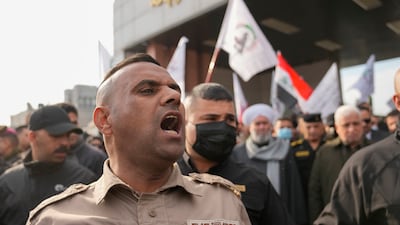In the end, the retaliation promised by the US for the deaths of three American soldiers in Jordan last week was not long in coming. Less than a week after US President Joe Biden said America would “hold all those responsible to account at a time and in a manner [of] our choosing”, it launched 85 strikes against Iran-allied militia targets at four locations in Syria and three in Iraq. It is unlikely to be America’s final word on the matter.
Then, on Saturday – just a day after the operations in Iraq and Syria – the US and Britain carried out a third round of strikes against Houthi targets in Yemen, meaning that in the space of two days, three Arab countries were the site of powerful strikes from a global superpower. This spectacle is understandably worrying, as these strikes are not carried out in a vacuum but are often in the vicinity of civilian locations. Moreover, there are the calculations of what kind of backlash it could produce.

Meanwhile, Washington’s key ally in the region continues with an offensive in Gaza that has sown the seeds of anger across the Arab world. A day after European nations called for the southern city of Rafah – the last refuge for a million displaced Palestinians – to be spared, Israeli forces struck at dawn on Sunday, with the Palestinian news agency Wafa reporting that two children were among civilians killed in a strike on a nursery. Strikes were also reported across the southern city of Khan Younis, Deir Al Balah and Nuseirat refugee camp in central Gaza.
It is a deeply complex and volatile mix, with plenty of room for miscalculation. Into this scene steps US Secretary of State Antony Blinken who is beginning a regional tour – his fifth since October 7 – of Saudi Arabia, Egypt, Qatar, Israel and West Bank. The US is in a tough spot and Mr Blinken will have to demonstrate some deft diplomacy. Although Washington may want to talk about peace and de-escalation, it needs to understand the profound anger that has met its support for Israel’s ongoing operation as well as its latest strikes on Arab countries.
Yes, the US was obliged to respond to the deaths of its troops, and the vast majority of governments in this region want to see Red Sea shipping remain open. However, Washington has the power to pursue a twin-track approach that not only deters those attacking it and international shipping but also reins in an Israeli state that is using US-supplied weapons in an assault on Gaza that has long ceased to be a proportionate response to the violence it suffered on October 7.
No-one knows where all this will end but there are some reasons for a little optimism. As The National revealed last week, a senior Iranian commander travelled to Baghdad and met Tehran-backed militants to urge de-escalation immediately after the deaths of the three US soldiers on the Jordanian-Syrian border, suggesting it may be the case that at least some of these groups will not seek to worsen the situation. Hezbollah, for all its rhetoric, has still not committed to a full-scale war on Israel’s northern border. In the US, the domestic clamour for a ceasefire in Gaza is growing, and Mr Biden’s team will be aware that the Middle East has become a livewire electoral issue.
Nevertheless, the people of this region should not have to live under threat like this, with weekly reports of air strikes, continuing horror coming out of Gaza, as well as the US and Iran accusing each other of escalation. All the various antagonists have it within their power to make sure this doesn’t become an uncontrollable situation. America has made its point. Now, if Mr Blinken’s visit is to achieve anything, it will have to be a demonstration of cool thinking and a long-term strategy for stabilisation amid a conflict that is threatening to grow out of control.


